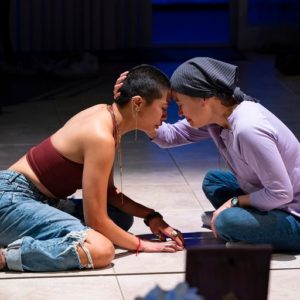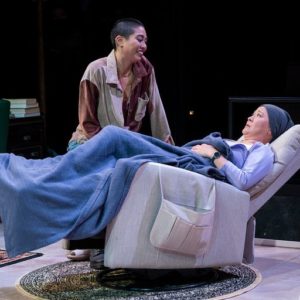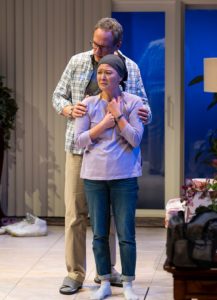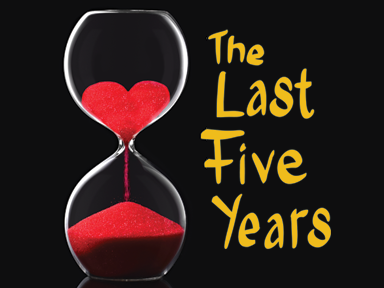
 rating=5]“Bald Sisters” is a masterful portrayal of an immigrant family from Cambodia who struggles to adapt to a new environment, separate and distinct from their country of origin. Playwright Vichet Chum has created a truly inspired story about two sisters and their mother whose feet are planted in two different worlds. Him, the older sister (Jennifer Lim), works to assimilate herself into mainstream American culture, while younger sister Sophea (Francesca Fernandez McKenzie) wants to hold on to Cambodian traditions for as long as possible. Him would prefer her memories to fade regarding what she and her mother had to endure under the Khmer Rouge and later in a displaced person’s camp in Thailand. Sophea, by contrast, has never lived through such horrendous conditions and wants to embrace a past that she cannot remember. She seems almost rebellious and free-spirited in the way she embraces Buddhism. This includes shaving her head as a ritually observant gesture considering that their mother has just passed away. Him, however, is bald for a very different reason: she is currently undergoing chemotherapy for breast cancer.
rating=5]“Bald Sisters” is a masterful portrayal of an immigrant family from Cambodia who struggles to adapt to a new environment, separate and distinct from their country of origin. Playwright Vichet Chum has created a truly inspired story about two sisters and their mother whose feet are planted in two different worlds. Him, the older sister (Jennifer Lim), works to assimilate herself into mainstream American culture, while younger sister Sophea (Francesca Fernandez McKenzie) wants to hold on to Cambodian traditions for as long as possible. Him would prefer her memories to fade regarding what she and her mother had to endure under the Khmer Rouge and later in a displaced person’s camp in Thailand. Sophea, by contrast, has never lived through such horrendous conditions and wants to embrace a past that she cannot remember. She seems almost rebellious and free-spirited in the way she embraces Buddhism. This includes shaving her head as a ritually observant gesture considering that their mother has just passed away. Him, however, is bald for a very different reason: she is currently undergoing chemotherapy for breast cancer.
The show begins with Him lighting some incense and doing a meditation. In so doing, she resurrects the exact moment when she was at Ma’s deathbed, comforting her while in the hospital. But when Ma (Wai Ching Ho) suddenly and unexpectedly dies, the event happens so quickly that Sophea only learns of Ma’s death via a voicemail—and this has made her quite angry. Sophea subsequently arrives at the home of her sister and her husband Nate (Coburn Goss), a Christian minister, in order to discuss the funeral arrangements and whether burial or cremation is what Ma would have wanted.
The story is just as much about the person of the deceased mother as it is about the relationship between the two sisters. Buddhism believes in the existence of ghosts, and unbeknownst to everyone, their mother has now become one! Through a series of visitations—through dreams, hallucinations, visions, and memories—we discover that Ma is a vibrant, irreverent soul, far from being the stereotype of a demur woman from a traditional culture. She is one-of-a-kind: bold, funny, and forthright. It is refreshing to see her constantly call her daughter “a bitch.” It is sweet, kind and endearing—and very real—all at the same time. When asked about being so blunt, she replies, “I can say whatever I want because I’m old, and being an Asian lady, I’m cute.” Much of the comedy has to do with Ma’s outrageous humor. Clearly, the star of the show is Wai Ching Ho, who lights up the stage from the beginning to the end of the performance and is more and more impressive every time she makes her appearance. We cannot get enough of her and her sparkling personality!
Most of the time Ma revisits the family as a ghost, but there is one occasion when she returns as an avatar in a computer program, developed by a college student/lawn boy named Seth (Nima Rakhshanifar). Seth too had a fondness for Ma and wanted to honor her in this special way. Moreover, Seth is extremely handsome, and there are all sorts of clever and funny sexually-tinged jokes throughout the show that involve him. Yet these comical scenes do not minimize the fact that he’s a Syrian refugee and has had his share of tzuris too.
The vagaries of all of their lives are packed together in a dramatic structure that seamlessly and instantaneously swings from the serious to the comedic. Just when the conversation addresses a grim subject matter (particularly in relation to death and dying), the dialogue suddenly shifts to a lighthearted subject or retort, and we feel comfortable laughing; nothing is forced. In fact, on the night I saw the performance, one actor accidentally broke character to laugh aloud, because the line was so funny; but that only added to the charm of the show. At the same time, character development in this script is amazing. We easily feel that we could walk up to each of the five characters and feel their genuineness and warmth: a tribute to both Chum’s superb scriptwriting and Jesca Prudencio’s fine directing. One hour and 45 minutes with no intermission goes by very, very quickly.
The multi-purpose set of living room, dining room, and kitchen, created by scenic designer Andrew Boyce, works very well in the theatre in the round setting. Props (especially those in the kitchen) are numerous and elaborate. Costume design by Izumi Inaba is more than appropriate; I especially loved the various outfits that Ma wore, especially the red dress in one scene and the leisure outfit and large glittery handbag in another. Lighting design is very important; Stacey Derosier does a nice job changing the color temperature of the lights to distinguish moments of hallucinations and visions from ordinary reality. The lighting of the hospital bed is especially well done. Company voice and text coach Gigi Buffington has made sure that cast members’ accents are on target.
The show educates you about the experiences of recent immigrants without beating you over the head about the horrors that once took place in the countries they came from. We learn something about Buddhism, Christianity, and Islam in a very easy-going way. We see how people learn to live with grief and illness and the loss of a loved one, and it has us asking a lot of questions not just about the characters but about ourselves. What aspects about a loved one do you choose to remember and why? And what events from the past have formed your present-day thinking? Even if Him couldn’t fully erase memories of the horrible times back in Cambodia, she could embrace the pleasant memories of her mother’s love. And even if Sophea never had memories of Cambodia fully formed, she could come to terms with the fact that her mother tried hard to protect her from knowing what this harsh reality was all about.
Although Ma showered her love on both of her daughters, she revealed different things to each, in keeping with how she viewed their distinctive personalities. Ma was also very selective about what she told each of them about the other. Her decisions about what information to impart and what to conceal will always remain a mystery but also a source of discussion. The fact that the audience learns how she shared different parts of herself with different people is a tribute to Chum’s brilliant scriptwriting, which constantly reinforces the depth of Ma’s character and her unique personality. And while Ma made a huge impact on her inner circle, she will make a great impression on you too!
This world premiere production of “Bald Sisters” is being staged at Steppenwolf’s newly-built Ensemble Theatre where views are unrivalled, acoustics are without equal, and every seat is the best in the house. You will definitely enjoy this touching show, whatever your ethnic or cultural background might be. And the ending is extraordinary!
“Bald Sisters” is playing through January 15, 2023, at the Ensemble Theatre at the Steppenwolf Theatre, 1646 N. Halsted Street, Chicago.
Tickets: $40-$86, depending on date and seat location
Students – $15 with valid ID (when available)
Performance schedule:
 Tuesdays, Wednesdays, Thursdays, Fridays – 7:30 p.m.
Tuesdays, Wednesdays, Thursdays, Fridays – 7:30 p.m.
(No performance, Tuesday, December 27th)
(No 7:30 performance, Wednesday, December 28th)
Saturdays – 2:30 p.m. and 7:30 p.m.
(No performances, Saturday, December 24th—Christmas Eve)
Sundays – 2:30 p.m.
(No performance, Sunday, December 25th—Christmas Day)
(No performance, Sunday, January 1st—New Year’s Day)
Additional performance:
Wednesday, December 28th – 2:00 p.m.
“MASKS REQUIRED” PERFORMANCES:
Wednesday, December 14, 2022 at 7:30 p.m.
Wednesday, December 28, 2022 at 2:00 p.m.
Saturday, January 7, 2023 at 2:30 p.m.
ACCESSIBLE PERFORMANCES:
Open captioned:
Thursday, December 22nd at 7:30 p.m. and Saturday, January 14 at 2:30 p.m.
ASL interpreted:
Friday, December 23rd at 7:30 p.m.
Audio-described and touch tour:
Sunday, January 8th at 2:30 p.m. (1:00 p.m. touch tour, 2:30 p.m. curtain)
For more information about this show and to purchase tickets, visit: https://www.steppenwolf.org/tickets–events/seasons-/2022-23/bald-sisters/.
You may also purchase tickets in person at the box office, located at 1650 N. Halsted Street,
or call 312-335-1650. Box office phone hours: 12pm-5pm, Tuesday-Saturday.
For additional help, contact: customerservice@steppenwolf.org.
For general information about other offerings this season, go to: https://www.steppenwolf.org/tickets–events/.






More Stories
“The Last Five Years” MILWAUKEE
“The Trial of Themistocles” reviewed by Julia W. Rath
“Titanique”